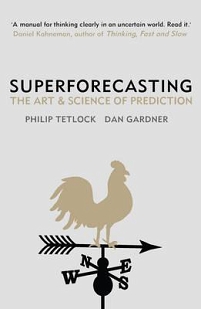Erstellt am: 21. 10. 2015 - 15:20 Uhr
Armin Wolf and his Dart-Throwing Chimp
Picture, for arguments sake, Armin Wolf, sitting with a chimpanzee holding a dart. In this plausible scenario, Wolf’s task is to predict the likelihood of a major world event, such as an economic crash or the start of a war, whilst the chimp’s job is to throw a dart at a board with various events written on it. Who will be more accurate in predicting the future? According to previous research by political scientist Philip Tetlock, if the events are more than a year out, the chimp has as much chance as poor old Mr Wolf.
This idea is highly amusing until you realise that the same problem is true for almost all commentators, businesses and intelligence agencies, despite the fact that companies and governments pour billions of euros into predictions. Suddenly our lack of forecasting ability seems a bit depressing.

Random House Books
The good news is we can change how good we are at making predictions, particularly those in the short term. That is the focus of Superforecasting, the latest book from Philip Tetlock and co-author Dan Gardner. Having started The Good Judgement Project, Tetlock discovered that a small number of people are extremely good at predicting events. So good, in fact, that sitting at their kitchen tables reading newspapers, they can beat the CIA.
There are two keys to good forecasting. Firstly, there is accurate measuring. Drawing on a comparison with the medical profession, which began making vast improvements once experiments were used to test the efficacy of medicines, Tetlock argues that by asking questions with specific time periods (for example, will Turkey be invited to join the EU in the next 6 months?) and by keeping track of the scores, we can force people into making more accurate predictions. Put bluntly, we can shame people into being right or at least learn to ignore those who are often wrong.
Secondly, there is thinking smartly. The world, according to Tetlock (via Isaiah Berlin’s excellent essay), is full of hedgehogs and foxes. Hedgehogs are capable of knowing one important thing, and are therefore terrible forecasters. Foxes, on the other hand, know lots of little things, and do not believe the world can be boiled down to one big idea. They make great forecasters because they use lots of little bits of information and experience to make minor adjustments to their forecasts. A fox doesn’t think in terms of 100% or 0%. Instead it prefers 56% to 44%.
So there we are. We can all just think a little more like foxes, and we’ll stop wasting an awful lot of money, right?
Unfortunately, it’s not that simple. Psychologically, we don’t like hearing from foxes, whether we are Presidents making important decisions or sitting in the U-Bahn sifting through the news. We much prefer to hear yes or no answers, and to read opinions of people who have a clear interpretation of current events. Until we change how we like to consume our news, we’re not really allowed to complain when events take a different turn and we’re left holding an empty plate.
This is why Tetlock describes himself as an ‘optimistic skeptic.’ There is a clear way to make progress with our forecasts, but it will be very difficult to do so. After all, a fox is far less interesting than Armin Wolf and his dart-throwing chimp.
My interview with co-author Dan Gardner on today's Reality Check:
Dieses Element ist nicht mehr verfügbar


